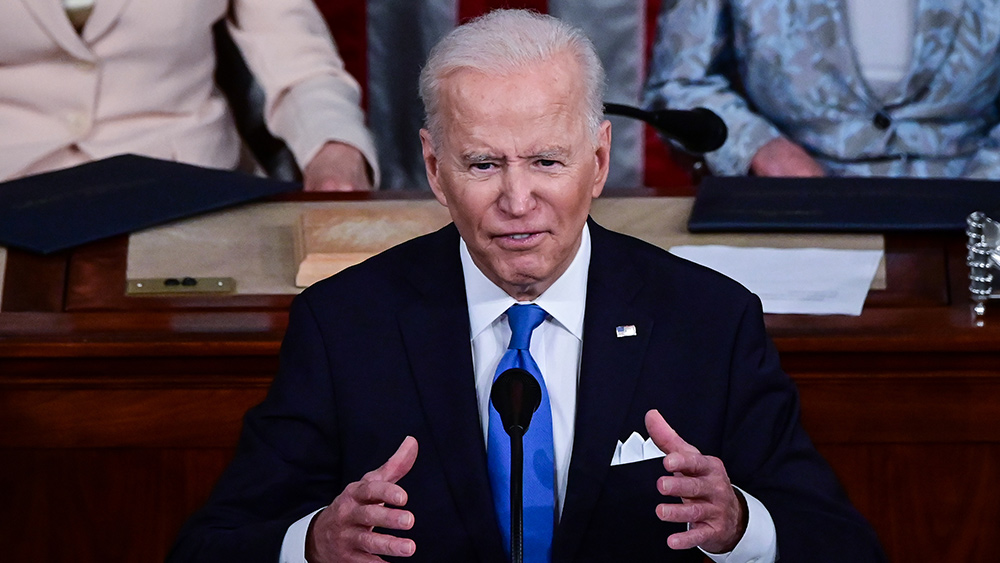Democrats float one-time “patriot tax” on multimillionaires’ wealth
06/18/2021 / By Franz Walker

New York Rep. Thomas Suozzi said that he’s exploring the idea of a one-time tax on the wealth of the richest Americans. The congressman’s statement comes as Democrats seek to increase taxes on the rich in order to pay for spending priorities.
Talking to the Hill on Friday, June 11, Suozzi, a member of the tax-writing House Ways and Means Committee, said that he’s looking into what he called a “patriot tax.” This would involve a one-time 2.5 percent surcharge on wealth between $50 million and $100 million as well as a 5 percent tax on wealth above $100 million. This tax, which wealthy people can pay over five years, would supposedly raise $450 billion based on research from Suozzi’s office.
According to Suozzi, his patriot tax would reflect the fact that many wealthy Americans were less affected by the Wuhan coronavirus (COVID-19) pandemic than those who’re less well off.
“We all know that people who are wealthy did very well during the pandemic and people that were low-income people did not do well,” he said.
“Patriot Tax” latest in line of wealth tax ideas from Democrats
Other Democratic senators, such as Sen. Elizabeth Warren and Sen. Bernie Sanders, have unveiled wealth tax proposals in the past. But these plans all included annual surcharges on wealth.
Unlike taxes levied on income and payrolls, a wealth tax would target wealthy Americans’ net worth – the value of their accumulated assets. The idea is that adjusting the tax system would combat growing inequality and create a more level playing field among the wealthy and middle classes.
Suozzi has yet to introduce any legislation based on his idea. In addition, the tax he’s proposing could face challenges while being enacted. Any wealth tax would be sure to face opposition from Republicans.
The proposal also comes amid a debate over how to pay for President Joe Biden’s infrastructure proposals, which combined would cost about $4 trillion. Biden has yet to support any sort of wealth tax, though he has called for tax increases on high-income households and corporations.
Suozzi states that the revenue raised by his “patriot tax” could help offset the cost of Biden’s infrastructure proposal. In addition, it would also help restore full state and local tax deduction, a top priority for the New York congressman and other lawmakers in the state.
Suozzi proposes wealth tax while also pushing for tax cuts for the wealthy
Suozzi’s proposal of a “patriot tax” on wealthy Americans comes after he pushed for a repeal of the $10,000 cap on federal tax deductions of state and local taxes, known as SALT.
The SALT cap was put in place in 2017 as part of the Republican’s massive tax overhaul. Democrats, and some Republicans, in states with high taxes – such as Suozzi’s state of New York – objected, likening it a gut punch for homeowners who already pay high local property taxes, Suozzi had previously stated that he would not support any of tax increases unless the SALT cap was also repealed. (Related: New York and Chicago resort to mafia-style tax tactics to prevent their “tax farm” citizens from escaping.)
The deduction has been criticized as a tax break for the wealthy. An analysis by the Joint Committee on Taxation showed that in 2017, well over half of the benefits from SALT deductions went to taxpayers making more than $200,000 a year.
But Suozzi claimed that those numbers needed to be put into context.
“$150,000 a year in New York doesn’t make you a wealthy person,” he explained. “That’s hard-working middle-class families. And they have been very hard hit by the cap on the SALT deduction.”
What doesn’t need to be put into context is how much revenue repealing the SALT cap would cost the federal government. A Tax Foundation analysis estimates that doing so would cost $600 billion in revenue over ten years, with the largest relief aimed at the top 1 percent of earners.
Follow GovernmentDebt.news for more on how the current administration plans to raise taxes.
Sources include:
Tagged Under: budget, coronavirus, covid-19, government taxes, pandemic, politics, SALT cap, tax cut, wealth tax
RECENT NEWS & ARTICLES
COPYRIGHT © 2018 GOVERNMENTDEBT.NEWS
All content posted on this site is protected under Free Speech. GovernmentDebt.news is not responsible for content written by contributing authors. The information on this site is provided for educational and entertainment purposes only. It is not intended as a substitute for professional advice of any kind. GovernmentDebt.news assumes no responsibility for the use or misuse of this material. All trademarks, registered trademarks and service marks mentioned on this site are the property of their respective owners.




















